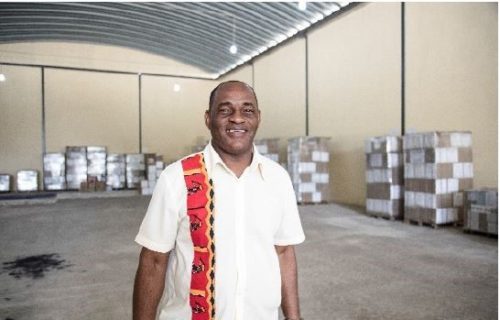Since printing the 500 different book titles, Vamos Ler! has distributed 10 million books to 1,950 schools in rural areas in Nampula and ZambeziaNampula, MozambiqueThe Mozambican population speaks more than forty indigenous languages, and 85 percent of the country’s population speaks Emakhuwa, Echuwabo and Elomwe. But Portuguese is Mozambique’s official language and remains the language of instruction in most Mozambican schools, despite that fewer than 3 percent of Mozambique people speak Portuguese as a first language.
Most primary school children struggle with developing reading skills because the school curriculum and children’s books are written in Portuguese. However, scientific research shows that children learn better when taught in their first language.
Limited availability of teaching and learning resources written in indigenous Mozambican languages is often cited as one of the barriers to implementing bilingual education in schools across the country.
Producing Teaching and Learning Materials in Local languages
Since 2016, USAID-funded Vamos Ler!/Let’s Read, a five-year bilingual early grade literacy program that seeks to improve 800,000 students’ reading and writing skills in partnership with the Mozambique Ministry of Education and Human Development (MINEDH), has supported the Government of Mozambique to develop teaching and learning materials in the three most spoken languages, Emakhuwa, Echuwabo, and Elomwe.

“To expand the bilingual education system in the country, one of the key starting points was the material development process. There was a general paucity of learning materials in local languages, a reality that is changing thanks to programs like USAID Vamos Ler!,” explains, Dr. Telesfero de Jesus, the National Director of Primary Education.
Over the past five years, Vamos Ler! has worked hand in hand with the Ministry on the development of hundreds of reading and learning materials written in the three languages and Portuguese for Grade 1 through Grade 4 students and teachers. Materials include student books, teacher manuals, scripted lesson plans, posters, alphabet charts, and story books.
“When we started this journey, none of us could have imagined that in a short period of time we would manage to develop so many books, nearly 500 titles. It is an amazing accomplishment. It is great legacy for the country,” says Dr. de Jesus.
Many people participated in the process of developing these materials.
The book writing process for each grade level always began with reviewing existing materials and sourcing local stories. Then, there was a workshop series for participants to collaboratively create new titles, including teachers, local authors, multi-language specialists, graphic designers, illustrators, and specialists from the Ministry and Vamos Ler!.
Community Buy-in from the Start
The program sought feedback from the community during the book development process because community and parent engagement is essential to the program’s success.
All books were field tested with teachers, parents/guardians, children and community leaders to verify that texts and images correlated and most importantly to confirm that books reflect local culture and context.
“The program brought many methodological innovations in the development of the books that we as MINEDH are going to keep using. Bringing the books to the community to test before they are delivered to the school was an important step; we could see the enthusiasm of parents and leaders of the community, as they have a saying on what their children are going to be taught,” says Dr. de Jesus.
Since developing nearly 500 different titles, Vamos Ler! has printed and distributed more than 10 million teaching and learning materials to 1,950 schools in rural areas in Nampula and Zambezia.
The program has certainly made an impression on Mozambican education by creating the country’s first major bilingual literacy program, as well as a distributing on a one-to-one ratio so that each student has a book that reflects local culture.